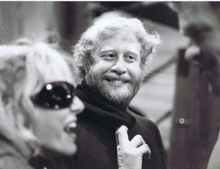Christopher Kringas

Christopher Kringas (1936-1975) is best known as the architect of the High Court of Australia.
The son of Greek migrants to Australia, Kringas grew up in Orange NSW before studying architecture at the University of NSW. He received the Royal Australian Institute of Architects 'Outstanding Graduating Student' prize in 1959,[1] then traveled to Europe and worked at the London County Council Architect's Department – seen as the "melting pot" of the New Brutalism movement in architecture and an incubator of seminal postwar architects.[2][3]
.jpg/440px-Dee_Why_Library_1966_(Photo_by_David_Moore).jpg)
Kringas returned to Sydney in 1962 and worked briefly at Budden Nangle & Michael architects, designing the Cockle House. In 1964 he joined the firm of Edwards Madigan Torzillo Briggs and, with the firm's senior director Colin Madigan, designed a series of significant Australian architectural works: the Dee Why Library; the Warren Library; Australian National Gallery Winning Competition Design; the Mitchell College Student Residences; and the Warringah Civic Centre. These innovative and acclaimed designs marked a new direction for the firm, distinct from its earlier orthodox Modernist productions. In 1966 Kringas was made an associate and in 1972 he became a director of the firm. Over the same period, Kringas produced a body of original solo works for private clients, including the Citroën Workshop, the J Kringas House and the Stevens House – described as an "individual masterwork".[4][5]
.jpg/440px-High_Court_Competition_Model_1973_(Photo_by_Max_Dupain).jpg)
From 1972-1974 Kringas designed the High Court of Australia, leading the team of Feiko Bouman, Rod Lawrence and Michael Rolfe (architects) and Aldis Birzulis (structural engineer), to win the open national competition. In 1973 the National Times described Kringas alongside Harry Seidler and John Andrews as the "best and brightest" of Australian architects.[6]
In March 1975 Kringas died of bowel cancer – 12 days before the construction of the High Court began – aged 38.[7] Director and close friend Hans Marelli oversaw the faithful execution of Kringas's design. The High Court as constructed is virtually identical to the winning competition design. A plaque in the public hall commemorates Kringas's role as the designer of the High Court.


.jpg/440px-High_Court_of_Australia_(Photo_by_Anthony_Basheer).jpg)
Designs
- Cockle House, Hunters Hill NSW Australia – 1962 (with Budden Nangle & Michael architects)[8]
- Citroën Workshop, Forrestville NSW Australia – 1966[9]
- Dee Why Library, Dee Why NSW Australia – 1966 (with Edwards Madigan Torzillo & Briggs)[10]
- J Kringas House – Killarney Heights NSW Australia – 1967[11]
- Warren Library, Warren NSW Australia, 1968 (with Edwards Madigan Torzillo & Briggs)[12]
- Australian National Gallery Winning Competition Design, Canberra ACT Australia – 1968 (with Edwards Madigan Torzillo & Briggs)[13]
- Stevens House – Richmond QLD Australia – 1969[14]
- Mitchell College Student Residences, Bathurst NSW Australia – 1970 (with Edwards Madigan Torzillo & Briggs)[15]
- Warringah Civic Centre, Dee Why NSW Australia – 1970 (with Edwards Madigan Torzillo & Briggs)[16]
- Lend Lease Urban Development (unbuilt) - Perth WA Australia - 1970 (with Edwards Madigan Torzillo & Briggs)[17]
- National Gallery of Australia, Canberra Australia – 1971 (with Edwards Madigan Torzillo & Briggs)[18]
- High Court of Australia, Canberra ACT Australia – Design 1972 to 1974, Construction 1975-1980 (with Edwards Madigan Torzillo & Briggs)
References
- ^ "Awards". Architecture Bulletin. 16 (8): 2. 1959.
- ^ Lang, Ruth (October 2014). "'Architects Take Command: The LCC Architects' Department". Volume. 41.
- ^ Kringas, S (2017). Design of the High Court of Australia. University of Sydney. p. 134. hdl:2123/18605.
- ^ McCaughey, Patrick (July 22, 1972). "Suburban Reality". Age. p. 14.
- ^ Kringas, S (2017). Design of the High Court of Australia. University of Sydney. pp. 150–198. hdl:2123/18605.
- ^ Whitton, Evan (October 15–20, 1973). "Australian Architects: The Best and Brightest". National Times. p. 29.
- ^ Foster, Susan (April 11, 1975). "Widow will Finish Her Husband's Books, Films". Australian: 10.
- ^ Kringas, S (2017). Design of the High Court of Australia. University of Sydney. pp. 181–182. hdl:2123/18605.
- ^ Kringas, S (2017). Design of the High Court of Australia. University of Sydney. pp. 183–186. hdl:2123/18605.
- ^ "Sir John Sulman Award, 1966: Library Dee Why". Architecture in Australia (August 1967): 601.
- ^ Kringas, S (2017). Design of the High Court of Australia. University of Sydney. pp. 187–190. hdl:2123/18605.
- ^ "Blackett Award 1968, NSW Chapter of the RAIA (jointly): Library for Warren Shire Council'". Architecture in Australia (December 1969): 1025–1027.
- ^ "'Winners Report' in 'Limited Competition, Australian National Gallery, Canberra, Competition Result'". Architecture in Australia (August 1968): 606–607.
- ^ Mackay, Ian. Living and Partly Living: Housing in Australia. Melbourne: Thomas Nelson. pp. 84–89.
- ^ "N.S.W. Chapter's Annual Architectural Awards". Architecture Today (June 1971): 12.
- ^ "Council Building". Constructional Review (May 1972): 36–39.
- ^ Kringas, S (2017). Design of the High Court of Australia. University of Sydney. pp. 194–197. hdl:2123/18605.
- ^ Kringas, S (2017). Design of the High Court of Australia. University of Sydney. pp. 167–175. hdl:2123/18605.